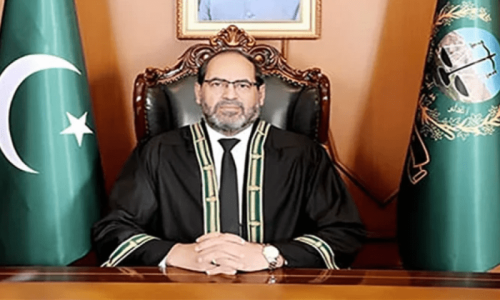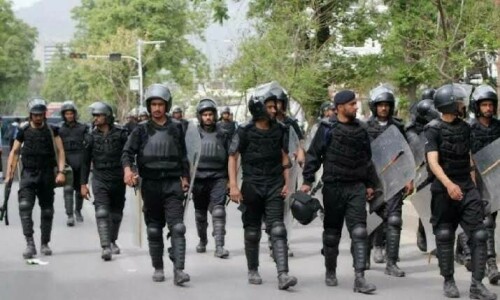ISLAMABAD: Former Punjab governor Sardar Latif Khosa, who is representing Pakistan Peoples Party (PPP) co-chairperson Asif Ali Zardari in the Benazir Bhutto murder case, alleged on Wednesday that former interior minister Chaudhry Nisar Ali Khan had given ‘safe passage’ to retired Gen Pervez Musharraf.
Mr Musharraf is one of the suspects in the Benazir murder case, but left the country in March last year after the interior ministry removed his name from the exit control list (ECL) after a three-year travel ban.
An anti terrorism court (ATC) in Rawalpindi had, earlier this year, acquitted five suspects from the banned Tehreek-i-Taliban Pakistan (TTP) in the same case, but convicted former deputy inspector general Saud Aziz and senior superintendent of police Khurram Shahzad.
Since he absconded, the court has issued perpetual warrants of arrest for Mr Musharraf and adjourned proceedings against the former military dictator sine die, until his arrest and subsequent appearance before the court.
PPP co-chairperson Asif Ali Zardari, who was not a party to the case in the trial court, has challenged the ATC’s sentence before the Lahore High Court’s (LHC) Rawalpindi bench.
PPP counsel criticises court’s acquittal of TTP men in Benazir murder case
A division bench, consisting of Justice Mazahar Ali Akbar Naqvi and Justice Tariq Abbasi, heard the matter on Wednesday and adjourned the proceedings after issuing notices to the alleged TTP suspects.
Talking to reporters after the hearing, Mr Khosa criticised the ATC verdict, saying that the trial should have been completed within a month, but the court took 10 years to pronounce its judgment.
He said there was enough evidence against the five suspects, but the court exonerated them.
He alleged that Mr Musharraf hatched a conspiracy to murder Benazir Bhutto, adding that when his trial was nearing completion; then-federal minister for interior Chaudhry Nisar Ali Khan provided the former dictator “safe passage” from the country.
He claimed that Chaudhry Nisar had tried to shift responsibility for this act to the courts, whereas there was no judicial order to this effect and the courts never asked the interior ministry to let Mr Musharraf proceed abroad.
When Mr Musharraf left the country, he was facing a high treason case before a special court in Islamabad and was also being tried for the murder of Lal Masjid cleric Ghazi Rasheed, as well as the Benazir Bhutto murder case.
The courts declared him an absconder in all these cases and initiated the process of confiscating his properties.
The apex court had, on April 8, 2013, ordered the government to place Musharraf’s name on the ECL and ensure that he did not leave Pakistan until the court order was varied or modified.
Following the court order, the interior ministry placed Mr Musharraf on ECL, but the Sindh High Court stuck down the order in June 2014.
The federal government challenged the high court order before the apex court and a five-member bench dismissed the federal government’s appeal in March last year.
Subsequently, the interior ministry removed Mr Musharraf’s name from the no-fly list.
According to the prosecution in the Benazir murder case, an email of the late Ms Bhutto to US lobbyist Mark Seigel connected Mr Musharraf with the murder.
Mr Siegel claimed that on Sept 25, 2007, Ms Bhutto received a telephone call that she later described as “a very bad call” from Mr Musharraf.
The statement said that the former military ruler had warned Ms Bhutto that “her safety depends on the state of their (Musharraf and Benazir’s) relationship.”
According to Mr Siegel, Ms Bhutto sent him an email on October 26, 2007, in which she expressed her sense of insecurity. She also said that if something happened to her, she would hold the military ruler responsible, apart from the individuals mentioned in her letter to Mr Musharraf on Oct 16, 2007.
In the letter, Ms Bhutto had named retired Brigadier Ejaz Shah, retired Lt-Gen Hameed Gul and former Punjab chief minister Chaudhry Pervaiz Elahi.
Published in Dawn, December 21st, 2017














































Dear visitor, the comments section is undergoing an overhaul and will return soon.